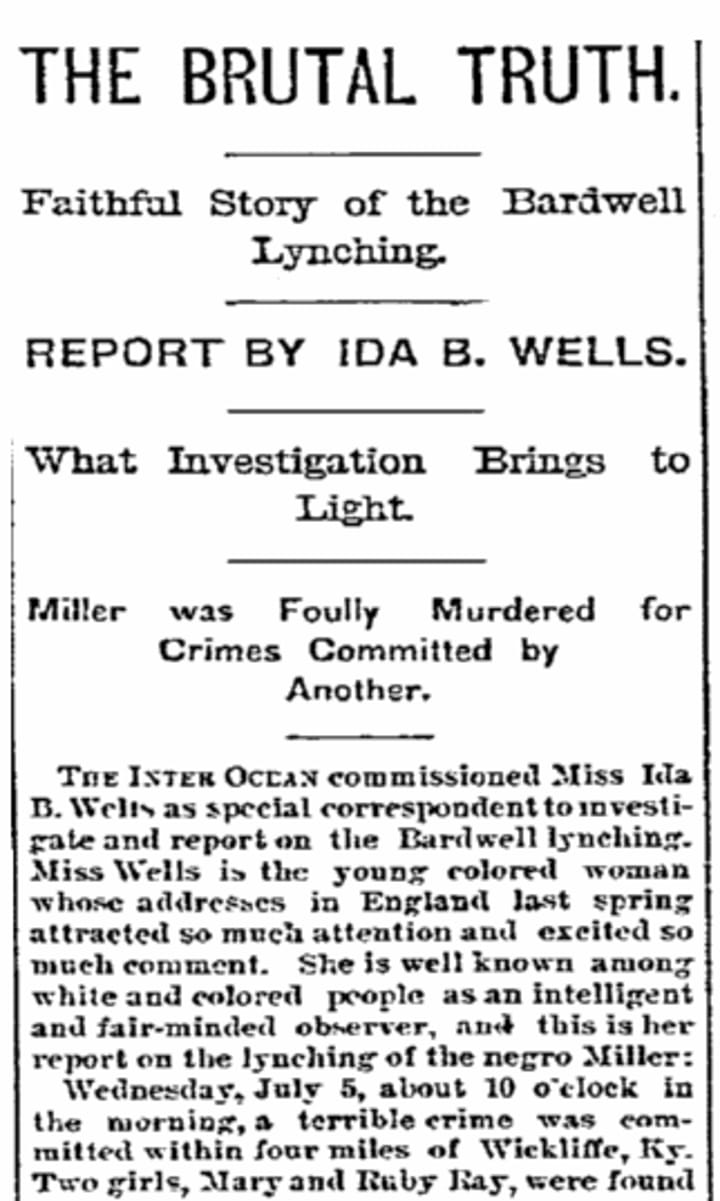The Life and Legacy of Ida B. Wells-Barnett
She went to war against the double edged sword of racism and sexism, and won.

Ida B. Wells-Barnett is often known for her journalism and activism. She was a pioneer in the women’s suffrage movement and went on to help found many organizations that play a pivotal role in today’s civil rights.
Ida’s Early Life
Ida B. Wells was born into slavery in the small town of Holly Springs, Mississippi on July 16, 1862. At the time, Holly Springs was dependent on the enslavement of African Americans laboring on cotton plantations. The town served as a bedrock of cotton trading. Within six months, the Emancipation Proclamation freed her family. This marked the beginning of her life of civil rights activism and suffrage.
Wells was sixteen when her parents and infant sibling died of yellow fever. Having no choice but to care for her remaining siblings, she got a job as a teacher at a nearby school. Shortly after, she moved to Memphis Tennessee to live with an aunt.
The Straw That Broke the Camels’s Back
“I felt that one had better die fighting against injustice than to die like a dog or a rat in a trap.”
-Crusade For Justice, Ida B. Wells-Barnett
On one Spring night in 1884, Wells bought a first class train ticket from Memphis to Nashville. During the train ride, the crew ordered her to move to the cars designated for African Americans. Outraged, Wells-Barnett refused and was forcibly removed from the train, biting one of the crew members on the hand in the process.
She later filed a lawsuit against the train car company and settled outside of court for a fixed amount. However the ruling was later overturned by the Tennessee Supreme Court.
Faced with outrage over the injustice, Wells picked up her pen and began writing. She used her journalism as a channel to bring awareness about the lynching, Reconstruction era politics, and grave injustice.
Anti-Lynching Activism
“Scourged from his home; hunted through the swamps; hung by midnight raiders, and openly murdered in the light of day, the Negro clung to his right of franchise with a heroism which would have wrung admiration from the hearts of savages.”
-A Red Record, Ida B. Wells Barnett
With her pen fixed under the Pseudonym “Lola”, Wells began to write for various newspapers, reporting on widespread lynchings and mob burning, and violence against black women and children. This included calling out the Women’s Christian Temperance Movement, for their hypocrisy and support of southern lynchings.
She began to write on a larger platform for newspapers such as The Memphis Free Speech. She faced backlash from angry mobs. Some mobsters grew so angry with her that they broke into her business and destroyed her printing press. Afterwards, they made it punishable by death for her to return back to the town in which she lived. Wells didn’t let threats or death stop her, she pushed on in the name of justice.
Through her writings she began to gain the support of W.E.B. Du Bois, Fredrick Douglas, and her future husband and lawyer-editor Ferdinand Barnett. She went on to have four children with him and continued her activism.

Women’s Suffrage
“Not only is it true that many of the alleged cases of rape against the Negro, are like the foregoing, but the same crime committed by white men against Negro women and girls, is never punished by mob or the law. A leading journal in South Carolina openly said some months ago that “it is not the same thing for a white man to assault a colored woman as for a colored man to assault a white woman, because the colored woman had no finer feelings nor virtue to be outraged!” Yet colored women have always had far more reason to complain of white men in this respect than ever white women have had of Negroes.”
-A Red Record, Ida B. Wells-Barnett
Multiple studies have proven that black women are raped at a higher rate than other races. Wells-Barnett spoke extensively on how society’s views of black women perpetuated falsehoods about their sexuality. She reported on the ways in which bkack women were historically raped and how it was not punishable by law to rape them, in contrast to the punishments enacted against violence towards white women.
She also wrote about how she was treated by other suffragists. We are taught in school that women like Susan B. Anthony and Elizabeth Cady Stanton are heroes of women’s suffrage. What we are not told is that they actually parted ways with abolitionists in the fight for universal voting rights. Many suffragists were angry that black men got the right to vote before a white woman did. Ida B.Wells-Barnett boldly called them out for not taking a true stand for universal suffrage, especially that of oppressed black men and women. As a result, she was banned from many suffragist clubs and organizations.
Once again, this didn’t stop Ida. She went on to found many civil rights and women’s suffrage organizations including the London Anti-Lynching Commitee. Many of the women who were once against her actually turned around and became members of the organization. Wells-Barnett also went on to help found many women’s voting institutions and other civil rights organizations such as the NAACP and the National Association of Colored Women’s Clubs.
We are taught to hail the women’s suffrage movement as winning women the right to vote with the 19th amendment, yet that couldn’t be further from the truth. Black women weren’t actually able to vote on a large scale until the Voting Rights Act of 1965. This was due to the contribution of many of the groups that Wells-Barnett helped found. The NAACP made a pivotal move in the civil rights movement with the win of Brown VS Board of Education which ended segregation. Today, it is the largest and most pre-eminent civil rights organization in the nation. The National Association of Colored Women was the largest colored women’s suffrage and civil rights group during the civil rights movement and continues to hold conferences today.
In Conclusion
I don’t want to think of a world without Ida B. Wells-Barnett having lived in it. Her absolute fearlessness and blazing fire for justice allowed her to trailblaze equality and opportunity for black women in America today. She did not fear death or slander, but loved the truth and fought for it, and in turn fought for us too.
About the Creator
She Writes
Freelance writer.
G o o d v i b e z o n l y .






Comments
There are no comments for this story
Be the first to respond and start the conversation.